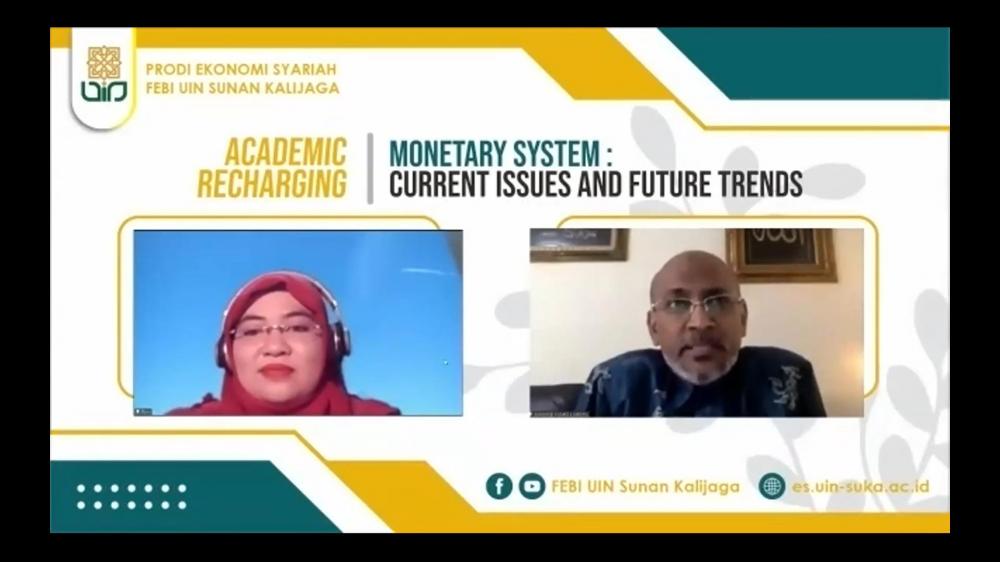ACADEMIC RECHARGING MONETARY SYSTEM: CURRENT ISSUES AND FUTURE TRENDS

On Monday, November 9, 2020, the Islamic Economics Study Program, FEBI, UIN Sunan Kalijaga held a webinar under the theme "Academic Recharging Monetary System: Current Issues and Future Trends." The event featured Prof. Dr. Ahamed Kameel Mydin Meera, a Professor at the International Islamic University Malaysia and Managing Director of Z Consulting, as the speaker. Mrs. Riswanti Budi Sekaringsih, M. Sc, a lecturer at the Faculty of Islamic Economics and Business, UIN Sunan Kalijaga, moderated the webinar. The webinar was conducted via the Zoom platform and was attended by 277 participants. The event commenced with an opening by MC Hanifa Salsabilla, a student of the Islamic Economics Study Program, followed by a speech from Mr. Abdul Qoyum, the head of the Islamic Economics Study Program. Notably, the webinar was conducted in both English and Indonesian, adding to its appeal.
The speaker elaborated on the economic conditions following the Covid-19 pandemic, highlighting a recession and a downturn in economic growth. The current supply and demand curve was also examined, revealing disparities from previous years. The speaker expressed deep concern about this situation, emphasizing the significant impact of the economy on a country's development.
Following the explanation of the current economic situation, the speaker detailed the measures undertaken by the Malaysian government to address these conditions, including initiatives to boost public engagement in giving zakat and wakaf, as well as providing financial assistance to affected communities. The current situation has also led to an increase in the circulation of money, particularly through street vendors and online businesses.
Furthermore, the speaker discussed the wisdom and opportunities for the community arising from Covid-19. One of the wisdoms highlighted was the increased implementation of zakat, wakaf, and sadaqah, along with advancements in technology and health in accordance with Islamic law. The opportunities identified encompassed the advancement of Islamic finance and the growth of the local economy.
The subsequent discussion centered on the economic situation in the new normal, highlighting the advancement of technology (e-business, e-marketing, and e-education), the development of 5G internet, the prevalence of remote work, necessitating an upsurge in skills and talents, and the progress of community agriculture and traditional medicine. It was also noted that there are unfavorable aspects of the new normal, including potential health effects and a decrease in social interaction among communities.
During the final session, a question and answer segment took place between the speakers and the participants. Several intriguing questions were posed, including how to confront a recession. The speaker responded by suggesting that the central bank can resort to printing money if the situation becomes untenable, promote the advancement of digital money, and encourage charitable donations to financial institutions. Another question revolved around when the pandemic would end. The speaker indicated that it ultimately depends on Allah, but also on the government's policies in managing the circulation of money to ensure the smooth functioning of the economy.
